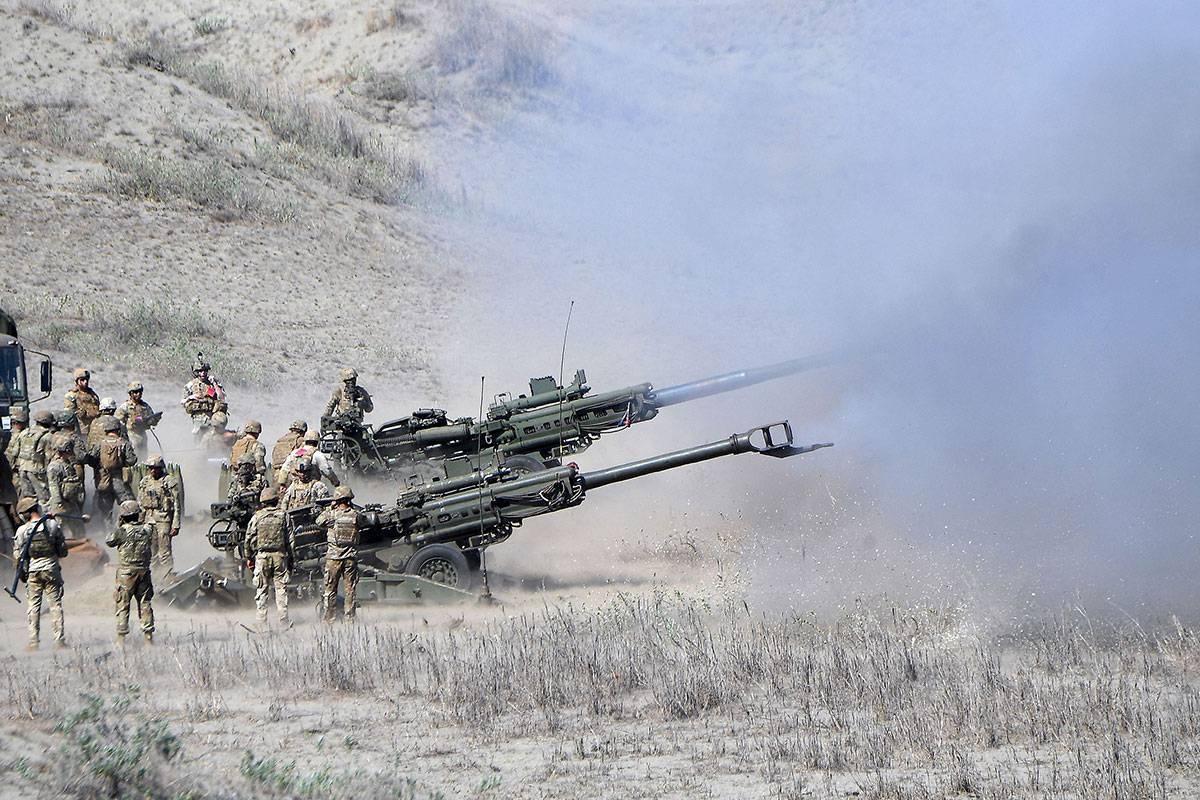
(UPDATE) PRESIDENT Ferdinand Marcos Jr. on Monday ruled out installing water cannons on Philippine ships sailing through the West Philippine Sea (WPS) and said the country would not respond in kind to recent Chinese attacks on its vessels.
"What we are doing is defending our sovereign rights and our sovereignty in the WPS and we have no intention of attacking anyone with water cannons or any such offensive (equipment)," the President said.
Beijing has dispatched hundreds of coast guard and other vessels to press its claims over most of the vital waterway despite an international tribunal ruling that its assertion has no legal basis.
In the latest confrontation on April 30, Manila said the China Coast Guard damaged a Philippine Coast Guard (PCG) ship and another government vessel with high-pressure water cannons as the boats were bringing fuel, food and water to Filipino fishermen at Ayungin (Scarborough) Shoal.
"We will not follow the Chinese coast guard and the Chinese vessels down that road," Marcos said Monday when asked if Manila would start using the water cannons on its own coast guard vessels to retaliate.
"It's not the mission of our navy, our coast guard to start or to increase tensions," he said.
Marcos added that "the last thing" the Philippines wanted was "to raise the tensions" in the disputed waters.
A PCG spokesman said Wednesday that Manila's strategy was to expose and seek international condemnation of Beijing's behavior in the South China Sea to encourage united efforts to ensure freedom of navigation in the strategic waterway.
Marcos said the Philippines would continue responding to South China Sea incidents through diplomatic means.
He also said that while the country would continue to assert its rights in the WPS, it will not use any "offensive weapon" against anyone.
Last week, Manila summoned a senior Chinese envoy to protest "the harassment, ramming, swarming, shadowing and blocking, dangerous maneuvers, (and) use of water cannons" by China Coast Guard vessels against Philippine boats off the disputed Ayungin Shoal.
Manila and Washington have a mutual defense treaty, and the recent confrontations between Philippine and Chinese vessels have fueled speculation as to what might force the United States to intervene.
Marcos said last month that US Defense Secretary Lloyd Austin had given assurances that the treaty would be invoked if another "foreign power" killed a Filipino soldier.
Earlier this week, Senate Minority Leader Aquilino Pimentel III said the Philippine Coast Guard ships should be equipped with water cannons so that it can also blast water on Chinese vessels the next time they use such a tactic to harass Philippine vessels on resupply missions in the WPS.
But Sen. Jinggoy Estrada on Monday said he supports the President's decision to abstain from employing water cannons or any other offensive measures as a countermeasure against Chinese aggression in the WPS.
The position taken by the President "demonstrates his dedication to upholding stability, diplomacy, and the long-term interests of our country," Estrada said in a statement on Monday.
"Instead of resorting to retaliatory measures, we will assert our rights through diplomatic means. We have consistently filed diplomatic protests to address China's aggression within our territorial waters," he said.
"It is our responsibility to remain steadfast in safeguarding our maritime and sovereign rights through a rule-based approach," said Estrada, chairman of the Committee on National Defense and Security.
He said the Philippine Navy and the PCG have a "crucial duty of safeguarding our territorial integrity and maritime rights."
"We must focus our efforts on ensuring the protection of our territorial and maritime interests by adhering to the principles of the rule of law. This entails the use of diplomatic channels and peaceful means of conflict resolution," Estrada said.
Sen. Francis Tolentino described Marcos' position as "pragmatic and responsible."
Dig deeper
Meanwhile, Sen. Francis Escudero said President Marcos should dig deeper into China's claim that it had come to an arrangement with the Philippine military in managing the sea row but which defense officials described as a "lie."
He said the President is the chief architect of foreign policy. Regardless of the existence or nonexistence of an agreement, verbal or otherwise, Marcos can reverse, amend, modify or abrogate it as President.
"And, after getting to the bottom of this, have DFA (Department of Foreign Affairs) properly communicate his decision with their counterparts as part of the discourse and dialogue in seeking a peaceful solution to the dispute," Escudero said.
The DFA on Sunday said it is "not aware" of any "model arrangement" being referred to by the Chinese Embassy in Manila with regard to Ayungin Shoal in the West Philippine Sea. It reiterated its firm position that the Philippines has "not entered into any agreement abandoning its sovereign rights and jurisdiction over its exclusive economic zone and continental shelf, including on the Ayungin Shoal."
"On issues of such importance, any agreements or arrangements would be made only if authorized at the highest level of government," the DFA said.
The department said that both the secretary of defense and the national security advisers have denied the existence of any informal arrangements on Ayungin Shoal "shows the untruthfulness of China's narrative."
"China should desist from disseminating such disinformation or insinuations against Philippine officials, which create confusion among the Filipino public and distract from the real issues created by China's unfounded claims, and illegal and aggressive actions in our waters," the DFA said.
The Philippines has been "earnest in seeking ways to reduce tensions with China through established diplomatic channels," it added.
"If China is serious about properly managing the differences at sea, we urge China to favorably consider the standing Philippine invitation to convene the next meeting of the Bilateral Consultation Mechanism on the South China Sea as soon as possible," the DFA said.
WITH AGENCE FRANCE-PRESSE AND BERNADETTE E. TAMAYO
Read The Rest at :









